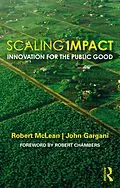Scaling Impact introduces a new and practical approach to scaling the positive impacts of research and innovation. Inspired by leading scientific and entrepreneurial innovators from across Africa, Asia, the Caribbean, Latin America, and the Middle East, this book presents a synthesis of unrivalled diversity and grounded ingenuity. The result is a different perspective on how to achieve impact that matters, and an important challenge to the predominant more-is-better paradigm of scaling.
For organisations and individuals working to change the world for the better, scaling impact is a common goal and a well-founded aim. The world is changing rapidly, and seemingly intractable problems like environmental degradation or accelerating inequality press us to do better for each other and our environment as a global community. Challenges like these appear to demand a significant scale of action, and here the authors argue that a more creative and critical approach to scaling is both possible and essential.
To encourage uptake and co-development, the authors present actionable principles that can help organisations and innovators design, manage, and evaluate scaling strategies. Scaling Impact is essential reading for development and innovation practitioners and professionals, but also for researchers, students, evaluators, and policymakers with a desire to spark meaningful change.
Autorentext
Robert McLean is Senior Programme Specialist in Policy and Evaluation at Canada's International Development Research Centre. He led the Scaling Science exploration, which underpins this book.
John Gargani is Founder and President of Gargani + Company, Inc. based in Berkeley, California. He is Past-President of the American Evaluation Association.
Klappentext
Scaling Impact introduces a new and practical approach to scaling the positive impacts of research and innovation. Inspired by leading scientific and entrepreneurial innovators from across Africa, Asia, the Caribbean, Latin America, and the Middle East, this book presents a synthesis of unrivalled diversity and grounded ingenuity. The result is a different perspective on how to achieve impact that matters, and an important challenge to the predominant more-is-better paradigm of scaling.
For organisations and individuals working to change the world for the better, scaling impact is a common goal and a well-founded aim. The world is changing rapidly, and seemingly intractable problems like environmental degradation or accelerating inequality press us to do better for each other and our environment as a global community. Challenges like these appear to demand a significant scale of action, and here the authors argue that a more creative and critical approach to scaling is both possible and essential.
To encourage uptake and co-development, the authors present actionable principles that can help organisations and innovators design, manage, and evaluate scaling strategies. Scaling Impact is essential reading for development and innovation practitioners and professionals, but also for researchers, students, evaluators, and policymakers with a desire to spark meaningful change.
Inhalt
Part I Scaling Science - An Emerging Paradigm
1. Introduction
Part II Four Guiding Principles for Scaling Impact for the Public Good
2. On Guiding Principles
3. Guiding Principle 1: Justification
4. Guiding Principle 2: Optimal Scale
5. Guiding Principle 3: Coordination
6. Guiding Principle 4: Dynamic Evaluation
Part III Case Studies
7. Scaling Ecohealth for Chagas disease prevention in Central America
8. Scaling access to justice for survivors of sexual violence
9. Scaling salt reduction policies and programs in Latin America
10. Scaling Southern policy research to a global level: Southern Voice
11. Scaling a nutrition intervention on the market: promoting locally fortified sunflower oil using e-vouchers
Part IV Pathways to Scale
12. Pathways to Scale
Part V Moving Forward
13. Moving Forward
Appendix: Methods Note
